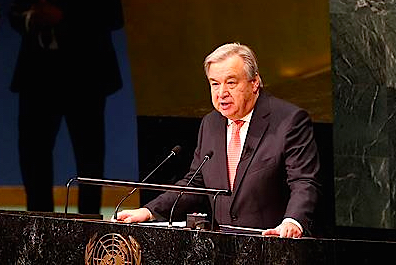In his latest remarks to the Turtle Bay Security Roundtable on March 23, entitled “Managing the Frontiers of Technology” – Mr. Guterres while praising the advance of what he termed as the Fourth Industrial Revolution, he also cautioned that “Advances in technology are giving rise very quickly to new methods and means of warfare with potentially undesirable or unclear consequences.”
The secretary-general commented on the long-term outlook regarding deployment of new methods of warfare that he said, “could potentially allow armed conflict to be waged from greater distances, at faster speeds and with enhanced destructive power.” He also added that the world is already realizing the effects of such newer warfare technology, which most certainly has major consequences in relation to “escalation control and attribution.”
Though he took a cautionary tone, the secretary-general proposed some concrete safeguards and preventive measures that have the potential to actually decrease weapons escalation and promote non-proliferation. Several contemporary examples that he referenced included the use of shared ledger technology known as Blockchain, for nuclear safeguards, machine learning in multilateral disarmament verification, that he mentioned the Comprehensive Nuclear Test Ban Treaty Organization is pioneering.
Advances in the Fourth Industrial Revolution are bringing about major positive changes in healthcare, transport and manufacturing, Mr. Guterres remarked. He also said that these new technological advances can assist millions in eliminating poverty, realizing the Sustainable Development Goals and allowing developing countries to more rapidly advance to a better future.
An example of technology that the United Nations is using, he said, is “unarmed, uninhabited aerial vehicles in our peacekeeping operations, helping to improve our situational awareness and to strengthen our ability to protect civilians.
Challenges lay ahead in what risks, new technologies may pose to regional and global stability, Mr. Guterres emphasized. And the fact that these technologies are readily available means that they could easily fall into the hands of terrorist groups, he cautioned. The ever present and real danger, the secretary-general reiterated is “an absence of confidence” among major powers that “we can witness every day in the Security Council.”
This calls for a stepped up and more rigorous vigilance for continued dialogue and diplomacy, the secretary-general remarked, as well as a need for taking more urgent preventive measures to the threat posed by nuclear weapons, which he added is “at a height not seen since the end of the Cold War, and tensions are running high and heated rhetoric is common.”
The overall goal must be to positively enhance the benefits of the technological revolution while “mitigating and preventing the dangers,” the secretary-general told the roundtable. He emphasized that in the current, global climate, “extra care” must be employed to avoid any action that might increase tensions or misunderstandings within the context of the 21st century arms race.
A key question that his report raised, is how can advanced 21st century technological innovations be used to promote disarmament within a logical, commonsense framework?
The secretary-general stressed that nations must “layer” their responses that could include industry self-regulation such as codes of conduct to promote responsible innovation while a second one includes the “robust implementation of national measures such as legal weapons reviews, pursuant to Article 36 of Additional Protocol I to the Geneva Convention.
The first step, he said that all nations can take is “a holistic attempt to improve global awareness and understanding of the implications of these interlinked technological advances on international peace and security.”
The unfortunate reality is that the long-term effects of most of this advanced technology has already been demonstrated as witnessed with the tragedy of Fukishima in Japan as well as the Chernobyl disaster whose radioactive fallout had a half life of 30 years while the actual effects have continued to linger in a wide swath of nations that also include the United States. The use of chemical weapons in Syria
Mr. Guterres concluded his remarks by saying that the “United Nations stands ready to assist however we can, but leadership on ideas and implementation must naturally come from the membership.” The secretary-general added that The Convention on Certain Conventional Weapons that deals with lethal, autonomous weapons systems is a prime example of the type of “multi-stakeholder dialogue” that can be convened within the UN system.
A much broader solution to be factored in, according to Mr. Guterres, is the First Committee of the General Assembly, which is a perfect forum for multilateral discussions but more importantly, civilian industry giants must be involved in such talks. And, he stressed that these “stakeholders” should be tied to government bodies to build rapport about mutual concerns while civil society and academics must also be welcomed as part of such a broader dialogue.
Mr. Guterres said he will be preparing a report on future developments in science and technology along with its potential impact on international security and disarmament with the input of Member States, to be read at the 73rd session of the Assembly.

